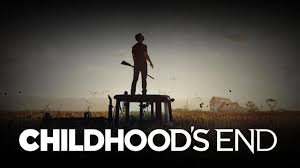 “Fifty years is ample time in which to change a world and its people almost beyond recognition,” says mathematician-novelist Arthur C. Clarke in Childhood’s End right after the end of World War II. “All that is required for the task are a sound knowledge of social engineering, a clear sight of the intended goal—and power.” Clarke shares center stage with George Orwell’s 1984 (1948) when he attempts to predict how ordinary places like Rapid City, South Dakota, will evolve into 2018 and beyond. Both novels describe a globally-defined media-drugged world where people no longer think for themselves, but are silently mentored on how to interpret all emotional and intellectual insights coming their way.
“Fifty years is ample time in which to change a world and its people almost beyond recognition,” says mathematician-novelist Arthur C. Clarke in Childhood’s End right after the end of World War II. “All that is required for the task are a sound knowledge of social engineering, a clear sight of the intended goal—and power.” Clarke shares center stage with George Orwell’s 1984 (1948) when he attempts to predict how ordinary places like Rapid City, South Dakota, will evolve into 2018 and beyond. Both novels describe a globally-defined media-drugged world where people no longer think for themselves, but are silently mentored on how to interpret all emotional and intellectual insights coming their way.
Clarke calls his social engineers the “Overlords,” but keen observers today see them as the business managers of media industry who own and disseminate the very thoughts and values that we think we’ve developed on our own. After all, Clarke easily remembered the bombing-defensive balloons floating over a vulnerable London in 1941. As Wikipedia describes, “The world’s now placid, featureless, and culturally dead: nothing really new has been created since the Overlords came. The reason’s obvious. There’s nothing left to struggle for, and there are too many distractions and entertainments”.
Historically accurate, Clarke senses that the Overlords intervene not long after the novel’s publication “in South Africa, where some time before their arrival Apartheid has collapsed and been replaced with savage persecution of the white minority.” He saw what was coming. One side can broadcast whatever it wants to, under cover of anonymity, the other side always having to apologize. Clarke predicted how political correctness would become a seemingly natural way of thinking that folks would see as their own.
It seems a shame that President Trump hasn’t highlighted our perverse media world in 2018 as being the universal monopoly that it is. They attack him 24/7/365 without remorse or rebuttal. No reform seems in the offing.


Please read this version of the post that nameless censors haven’t defiled:
“Fifty years is ample time in which to change a world and its people almost beyond recognition,” says mathematician-novelist Arthur C. Clarke in Childhood’s End right after the end of World War II. “All that is required for the task are a sound knowledge of social engineering, a clear sight of the intended goal—and power.” Clarke shares center stage with George Orwell’s 1984 (1948) when he attempts to predict how ordinary places like Rapid City, South Dakota, will evolve into 2018 and beyond. Both novels describe a globally-defined media-drugged world where people no longer think for themselves, but are silently mentored on how to interpret all emotional and intellectual insights coming their way.
Clarke calls his social engineers the “Overlords,” but keen observers today see them as the business managers of media industry who own and disseminate the very thoughts and values that we think we’ve developed on our own. After all, Clarke easily remembered the bombing-defensive balloons floating over a vulnerable London in 1941. As Wikipedia describes, “The world’s now placid, featureless, and culturally dead: nothing really new has been created since the Overlords came. The reason’s obvious. There’s nothing left to struggle for, and there are too many distractions and entertainments”.
Historically accurate, Clarke senses that the Overlords intervene not long after the novel’s publication “in South Africa, where some time before their arrival Apartheid has collapsed and been replaced with savage persecution of the white minority.” He saw what was coming. One side can broadcast whatever it wants to, under cover of anonymity, the other side always having to apologize. Clarke predicted how political correctness would become a seemingly natural way of thinking that folks would see as their own.
It seems a shame that President Trump hasn’t highlighted our perverse media world in 2018 as being the universal monopoly that it is. They attack him 24/7/365 without remorse or rebuttal. No reform seems in the offing.